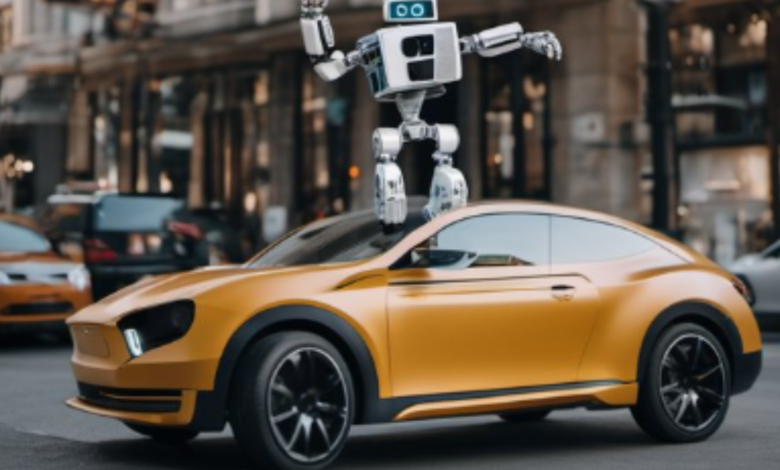The Future of Self-Driving Cars: A Revolution on Wheels is Coming!

The future of self-driving cars is no longer a distant dream; its rapidly becoming a reality. Autonomous vehicles, powered by artificial intelligence and advanced sensors, are poised to revolutionize transportation as we know it. From reducing traffic congestion and improving road safety to enhancing accessibility and transforming urban landscapes, the potential impact of self-driving cars is immense. While exciting opportunities abound, significant challenges remain, including technological hurdles, ethical dilemmas, and regulatory complexities. This article will delve into the key aspects of the future of self-driving cars, exploring the exciting possibilities and addressing the crucial challenges that lie ahead.
The Future of Self-Driving Cars: A Glimpse into a Driverless World
Imagine a world where commuting becomes a relaxing experience, where traffic jams are a thing of the past, and where transportation is accessible to everyone, regardless of age or ability. This is the vision that drives the development of self-driving cars. These vehicles, equipped with an array of sensors such as cameras, radar, lidar, and GPS, can perceive their surroundings, make real-time decisions, and navigate roads autonomously.
The technology behind self-driving cars is constantly evolving, with advancements in areas like artificial intelligence, machine learning, and computer vision. Deep learning algorithms are enabling vehicles to recognize and interpret complex traffic situations, while high-resolution sensors provide a 360-degree view of the environment. As these technologies mature, self-driving cars will become increasingly sophisticated, capable of handling a wider range of driving scenarios, from navigating busy city streets to traversing long-distance highways.
The future of self-driving cars promises a significant shift in transportation paradigms. Ride-hailing services could evolve into fully autonomous fleets, offering on-demand mobility without the need for human drivers. Public transportation systems could be transformed, with self-driving buses and shuttles providing efficient and accessible services to underserved communities. Logistics and freight transportation could also be revolutionized, with autonomous trucks streamlining supply chains and reducing transportation costs.
The Future of Self-Driving Cars: Revolutionizing Transportation as We Know It
The widespread adoption of self-driving cars has teh potential to revolutionize transportation in numerous ways. One of the most significant impacts will be a reduction in traffic congestion. By optimizing traffic flow and eliminating human error, self-driving cars can significantly improve the efficiency of transportation systems.
Furthermore, self-driving cars can play a crucial role in enhancing road safety. Human error is a major contributing factor to traffic accidents, and autonomous vehicles have the potential too significantly reduce the number of collisions. By eliminating distractions such as texting or drowsiness, and by making faster and more accurate decisions than human drivers, self-driving cars can create a safer driving environment for all.
The future of self-driving cars also holds the promise of increased accessibility. For individuals who are unable to drive due to age, disability, or other limitations, 1 self-driving cars can provide a much-needed lifeline. These vehicles can offer on-demand transportation services, allowing individuals to maintain their independence and mobility.
Moreover, self-driving cars can contribute to a more sustainable future. By optimizing routes and reducing idling time, autonomous vehicles can minimize fuel consumption and emissions. The integration integration of renewable energy sources, such as electric motors, can further reduce the environmental impact of transportation.
The Future of Self-Driving Cars: A World of Convenience and Freedom
The future of self-driving cars promises a world of unprecedented convenience and freedom. Imagine a world where commuting time is transformed into productive time, where you can work, relax, or simply enjoy the scenery while your vehical navigates for you.
With self-driving cars, the concept of car ownership may undergo a significant transformation. Instead of owning a personal vehicle that sits idle for most of the day, individuals may opt for subscription services or on-demand transportation options. This shift could lead to increased vehical utilization, reduced parking congestion, and a more sustainable transportation ecosystem.
Furthermore, self-driving cars can open up new possibilities for liesure and travel. Road trips can become more enjoyable and relaxing, with passengers able to focus on the scenery and enjoy the journey.
The Future of Self-Driving Cars: Addressing the Challenges and Ensuring Safety
While the future of self-driving cars is undeniably exciting, significant challenges remain. One of the primary concerns is ensuring the safety and reliability of autonomous vehicles.
The development of robust and reliable artificial intelligence systems is crucial for ensuring teh safe operation of self-driving cars. These systems must be able to handle unexpected situations, make ethical decisions in complex scenarios, and respond appropriately to unforeseen events.
Cybersecurity is another critical concern. Autonomous vehicles are connected to the internet and rely on software and data. ENsuring the security of these systems is paramount to prevent hacking attempts that could compromise vehicle safety and privacy.
Public trust and acceptance are also essential for the successful adoption of self-driving cars. Building public confidence requires transparent communication, rigorous testing, and a strong regulatory framework to ensure the safety and reliability of these vehicles.
The Future of Self-Driving Cars: A Future Where the Journey is the Destination
The future of self-driving cars holds the potential to transform our relationship with transportation. By addressing the challenges and embracing the opportunities, we can create a future where the journey itself becomes an enjoyable and enriching experience.
The development of self-driving cars will require collaboration between governments, industry, and academia.The future of self-driving cars holds the potential to transform our relationship with transportation. By addressing the challenges and embracing the opportunities, we can create a future where the journey itself becomes an enjoyable and enriching experience.
The development of self-driving cars will require collaboration between governments, industry, and academia.

